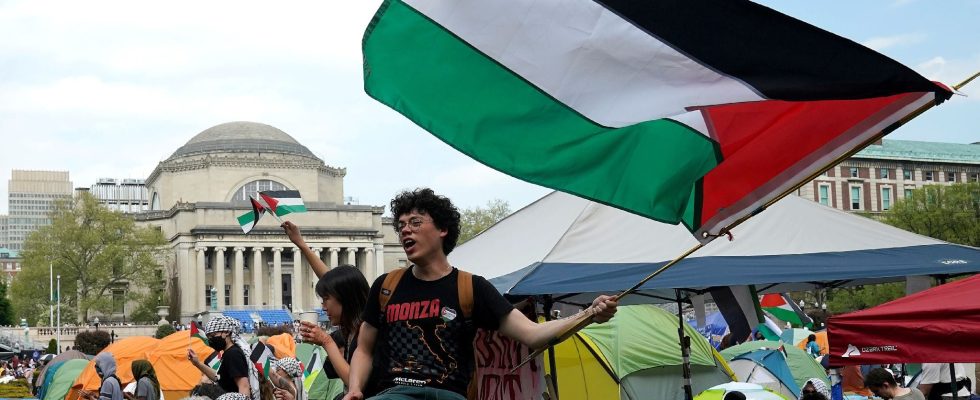Harvard, Yale or even Columbia. Since the Hamas terrorist attack on October 7 and Israel’s subsequent military response, American campuses have been the target of violent blockades and demonstrations in support of Palestine. On Tuesday, April 30, at night, Columbia University, the epicenter of the mobilization, was even evacuated by hundreds of New York police officers, to dislodge pro-Palestinian activists who were barricading themselves in a building. And this Wednesday, May 1, clashes broke out on the campus of UCLA University, in Los Angeles. L’Express takes stock of this gigantic movement which is shaking American universities.
What is the origin of the movement?
It all started on October 8, the day after the Hamas massacre. Around thirty student groups and clubs from the prestigious American University of Harvard, near Boston, co-signed and distributed on campus a letter denouncing “the apartheid regime of Israel”, “responsible for all the violence” which shapes “all aspects of Palestinian life for seventy-five years. In the process, pro-Palestinian “camps” were formed on dozens of campuses, and Jewish students expressed their unease. On December 5, during a parliamentary hearing on the fight against anti-Semitism in American universities, Claudine Gay, the president of Harvard, and her counterparts from the University of Pennsylvania and the Massachusetts Institute of Technology (MIT), were convened to find out the measures they have implemented to ensure the safety of students. Questioned by Trumpist elected official Elise Stefanik, who asked them if the call for the genocide of the Jews violated the internal regulations of their university, the latter replied that it “depended on the context”, causing a vast outcry and then their resignation.
The wave of protest against Israel’s war against Hamas in the Gaza Strip has been spreading across American universities for ten days. The movement started from Columbia where one hundred people were arrested on April 18. Since then, hundreds of others – students, teachers and activists – have been questioned, sometimes arrested and prosecuted in several universities across the country.
Which universities are affected?
In just under two weeks from October 8, pro-Palestinian “camps” emerged on more than 80 campuses, covering two-thirds of American states. Particularly strong in the northeast of the country (Columbia, Yale, NYU and Northeastern University), the mobilization is gradually spreading to Texas, Arizona and California. At the University of North Carolina at Chapel Hill, for example, a group of students raised a Palestinian flag in the center of campus, before the police put up the colors of the United States. Around twenty universities also used the police to intervene, such as UCLA, in Los Angeles, or Columbia, in New York, in recent hours.
In total, more than 900 people have already been arrested, including around a hundred at Northeastern (Boston), USC (Los Angeles) and Columbia. In the latter, the daughter of the Democratic representative to the House of Representatives, Ilhan Omar, would have been summoned to appear in court, according to the New York Times. During a visit to the campus camp last week, the elected official allegedly suggested that “some Jewish students supported the genocide [commis à Gaza]”.
At UCLA, clashes broke out during the night from Tuesday to Wednesday, on the sidelines of a pro-Palestinian rally, according to the police and images broadcast by American television. Demonstrators and counter-protesters clashed with sticks, threw objects at each other and fired fireworks at each other, according to television images. The clashes pitted pro-Palestinian and pro-Israeli groups, according to CNN. Pro-Palestinian students thus established a camp in the heart of the UCLA campus, on a lawn surrounded by barricades. The university’s chancellor, Gene D. Block, had warned, before these clashes, against the presence of people from outside the university. On Sunday, pro-Palestinian and pro-Israeli activists, supported by numerous demonstrators from outside the campus, came to blows, with shoving and insults.
The New York police on Tuesday evening dislodged pro-Palestinian demonstrators barricaded in a building at Columbia University, intervening manu militari in the epicenter of the pro-Palestinian mobilization on American campuses.
What are the movement’s demands?
If all of the mobilized students demand an immediate ceasefire in the Gaza Strip, many also urge their university to cut ties with companies and patrons linked to Israel, an injunction refused by Columbia. One exception, however: An elite northeastern campus, Brown University in Providence, Rhode Island, announced a deal with students: dismantling the encampment in exchange for a university vote in October on possible “divestments.” of ‘companies enabling and profiting from the genocide in Gaza’.
How does the political class react?
Six months before the presidential election, this student movement is causing a strong reaction in the political world. Joe Biden “must do something” against these “agitators,” Republican candidate Donald Trump said Tuesday evening on Fox News. “We must put an end to the anti-Semitism that plagues our country today,” he added. “While Columbia University is plunged into chaos, Joe Biden is absent because he is afraid to tackle the subject,” the Republican leader of the House of Representatives, Mike Johnson, wrote on X, In the evening. It has long called for the departure of its president, Minouche Shafik.
If Joe Biden initially condemned these excesses, the president is now taking refuge behind the First Amendment through the voice of the White House spokesperson, Karine Jean-Pierre. “The president considers that debates on campus, where one can express oneself freely and without discrimination, are important. But the demonstrations must be peaceful,” she said recently. “Occupying a university building by force is the wrong approach” and does not represent “an example of peaceful demonstration,” John Kirby, spokesperson for Democratic President Joe’s National Security Council, also thundered before the police intervention. Biden.
